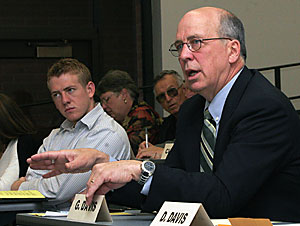 |
|
JOSH FIELDS/Arizona Daily Wildcat
|
Provost George Davis answers questions at the Faculty Senate meeting yesterday afternoon in the James E. Rogers College of Law. Davis presented specific guidelines regarding plans for upcoming program fees.
|
|
|
By Cassie Tomlin
Arizona Daily Wildcat
Tuesday, March 8, 2005
Print this
UA administrators yesterday made clarifications on statutes for proposing and accepting program fees.
Provost George Davis and Vice Provost Jerry Hogle presented their informational document "Guidelines and Protocols on Requests for Differential Program Fees" to the Faculty Senate.
Davis said the information clarifies the criteria for implementing program fees, an issue he said has "blindsided" some departments.
A program fee is a set amount of money in addition to tuition paid by all students in a certain department for the department's extra costs, Hogle said. Program fees are not covered by any university waiver options.
College deans make the initial proposals for program fees, which are then approved by Davis and President Peter Likins and sent to the Arizona Board of Regents to vote on.
Davis said program fees apply only to departments with higher-than-average student costs such as laboratory equipment and faculty salaries.
There are currently 13 program fees, including those for the James E. Rogers College of Law and Eller College of Management.
A $250 per semester Eller College of Management fee compensates for the high faculty salaries of the department, Hogle said.
Next semester, the Eller College's proposed program fee is $500 per semester.
In April, the board of regents will vote on proposed program fees for students in the College of Architecture and College of Engineering, and the extension of the Eller College fee.
In order for a proposed program fee to be considered, Davis said the program must be seen nationally as a professional department, which frequently requires extra charges at peer institutions.
"We'll look to the national market to demonstrate a range of rationale and reason," Davis said.
Davis also said it is important for faculty leaders to work with student leaders to determine whether or not to support a proposed fee.
Program fees connect to student's higher earning power after graduation because of the degree, Hogle said.
Davis said the program fees apply only to students advanced to major status. For example, Eller College students become majors at the junior class level and will then begin to pay the extra fees.
Among the statutes regarding program fees, Davis reiterated that 10 percent of the money goes to the Provost's Office "all funds" account. This money is not necessarily used in the department from where it came, he said.
At least 15 percent of the fee goes to financial aid funds, and the remaining amount to the specific college for varied investments in the proposal, Davis said.
